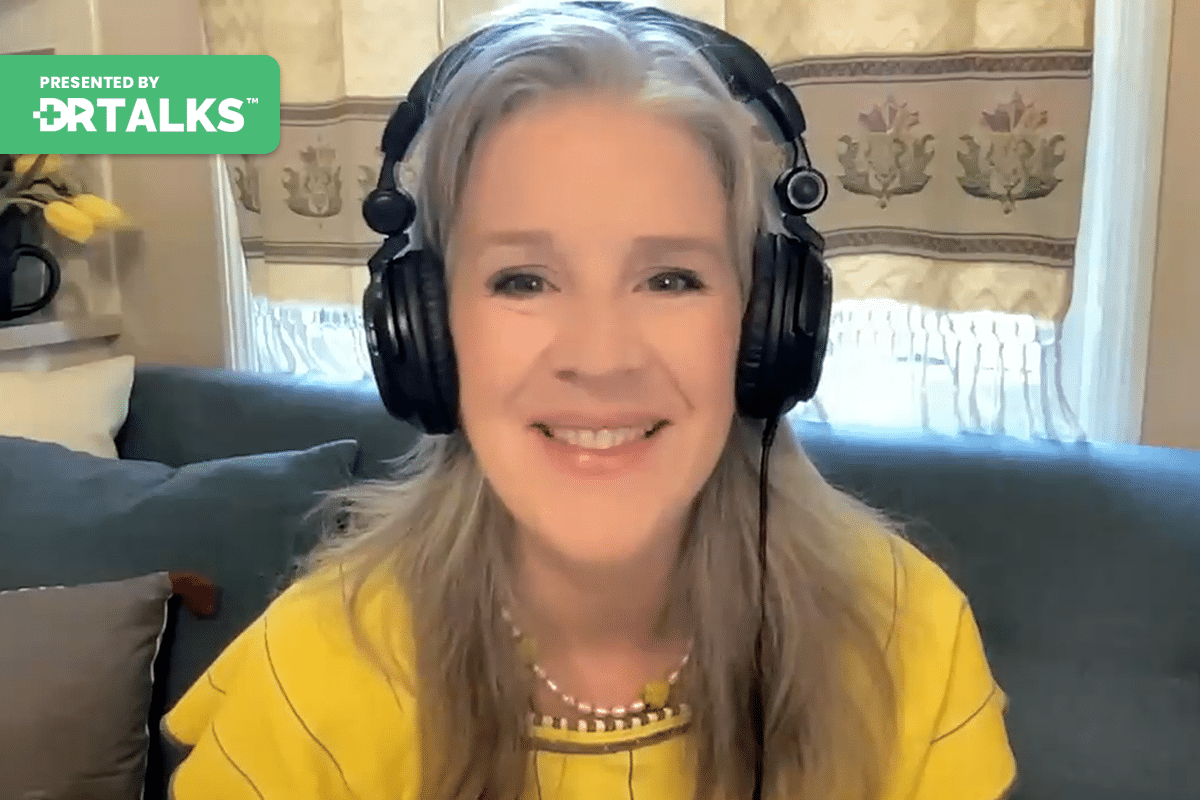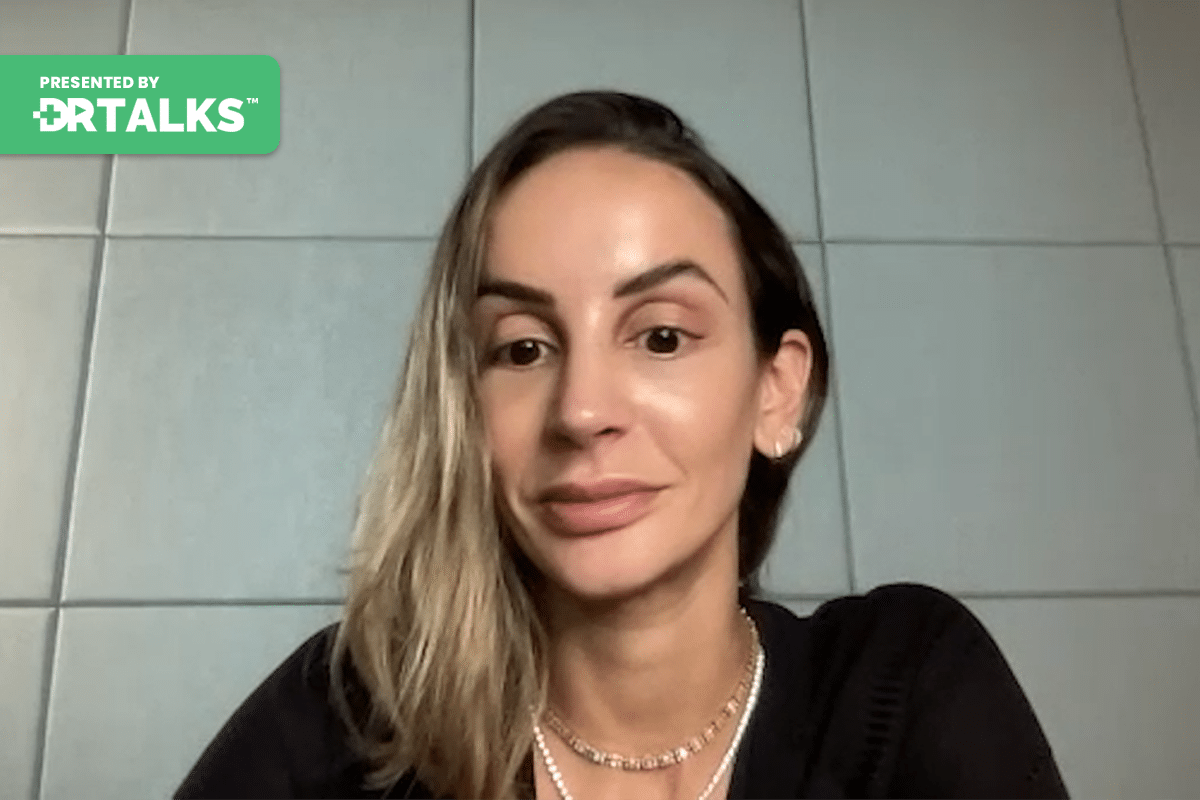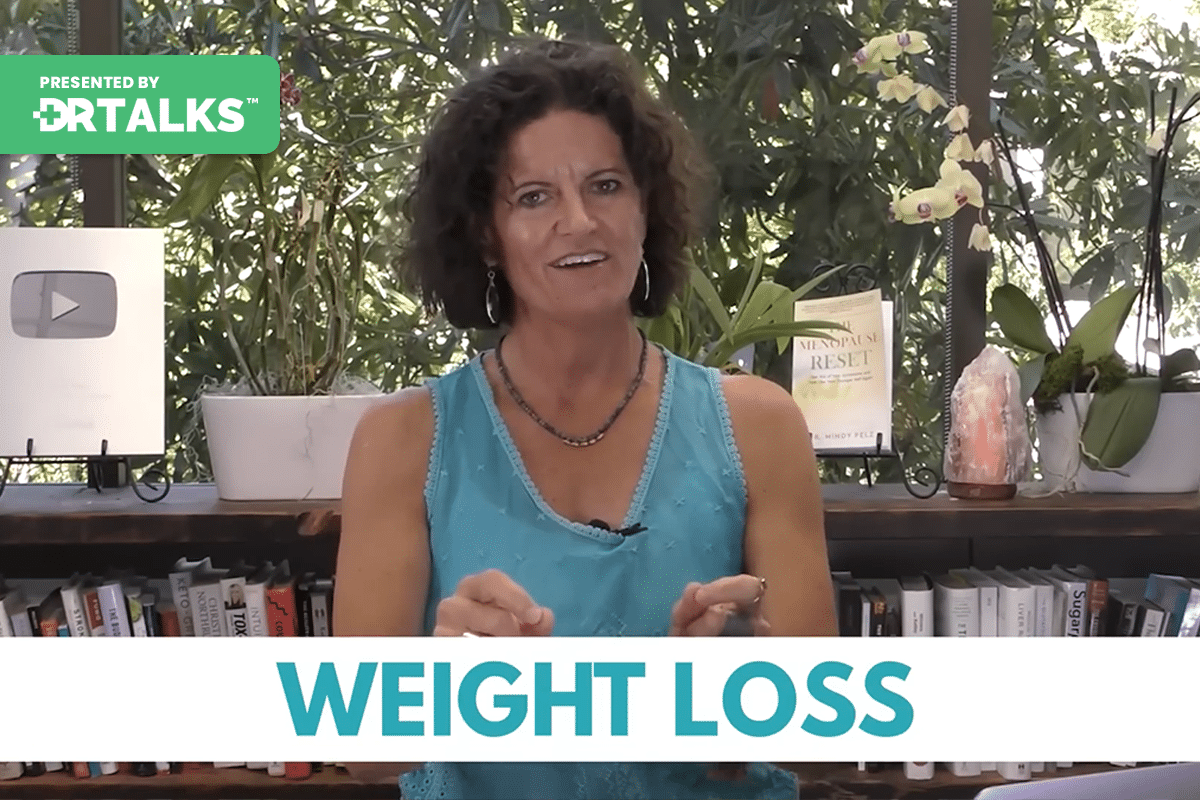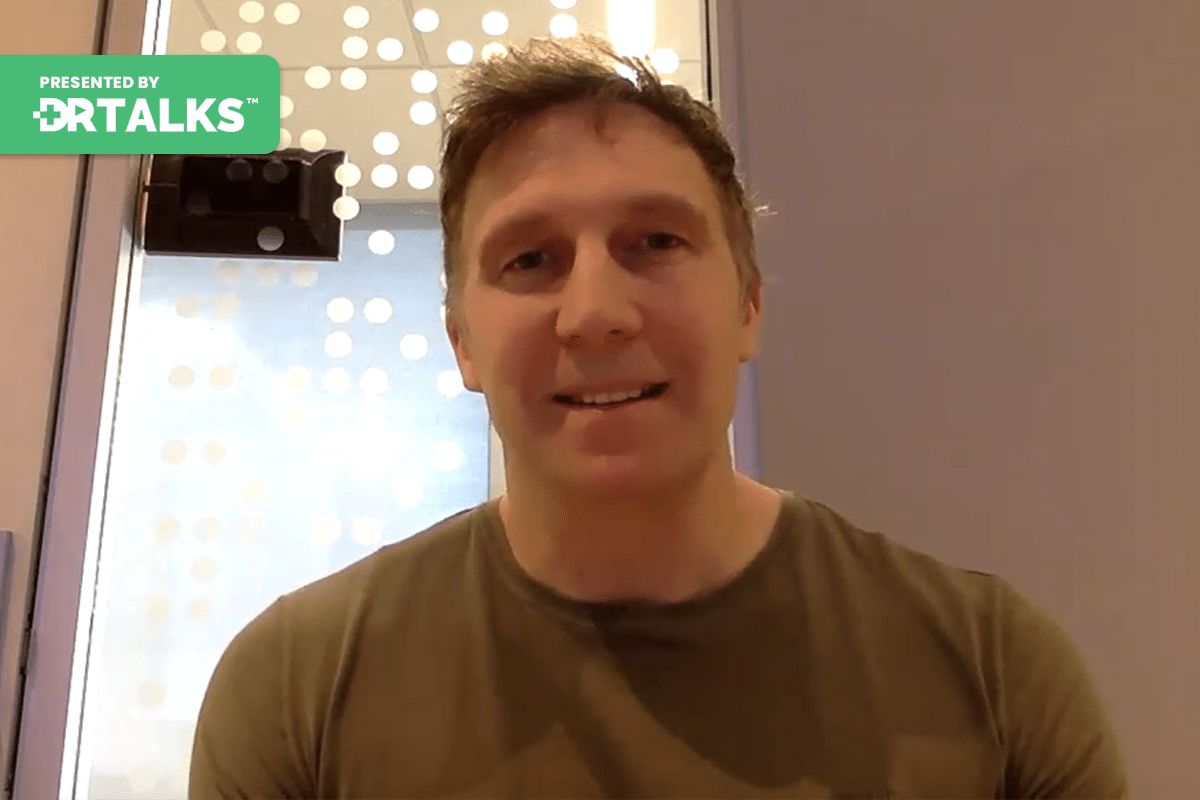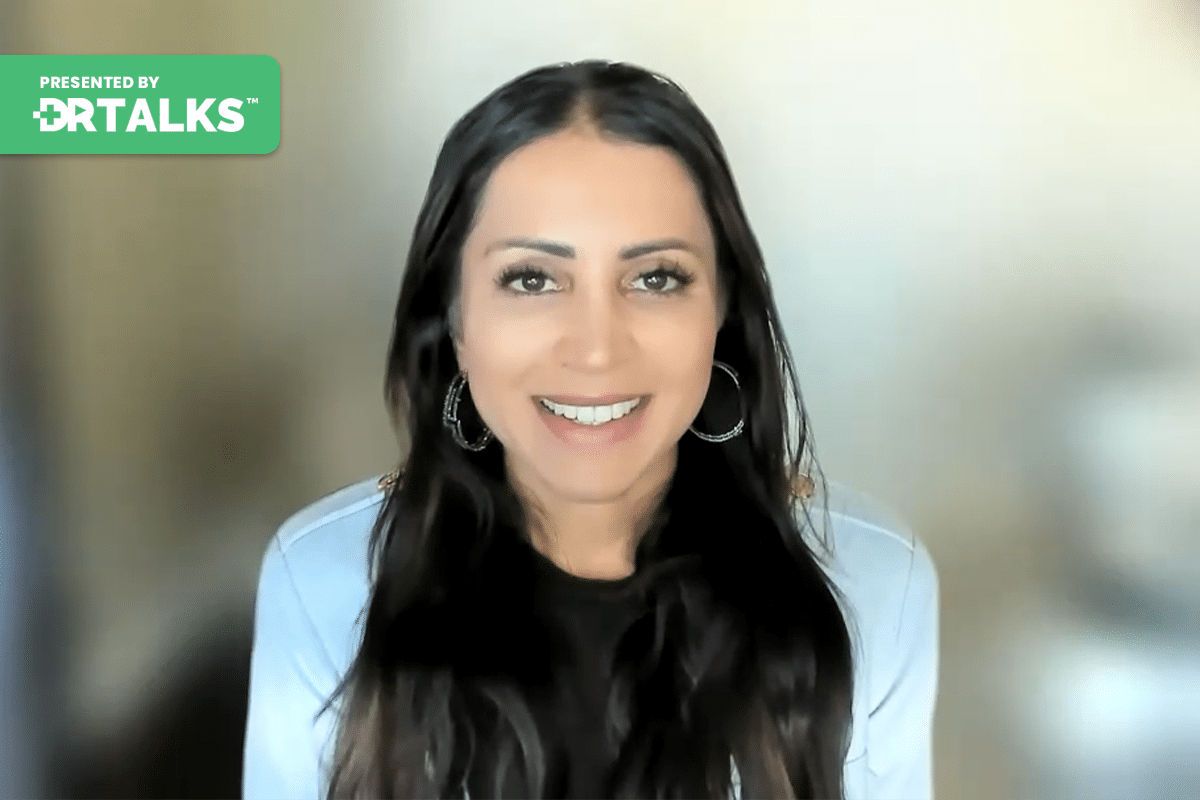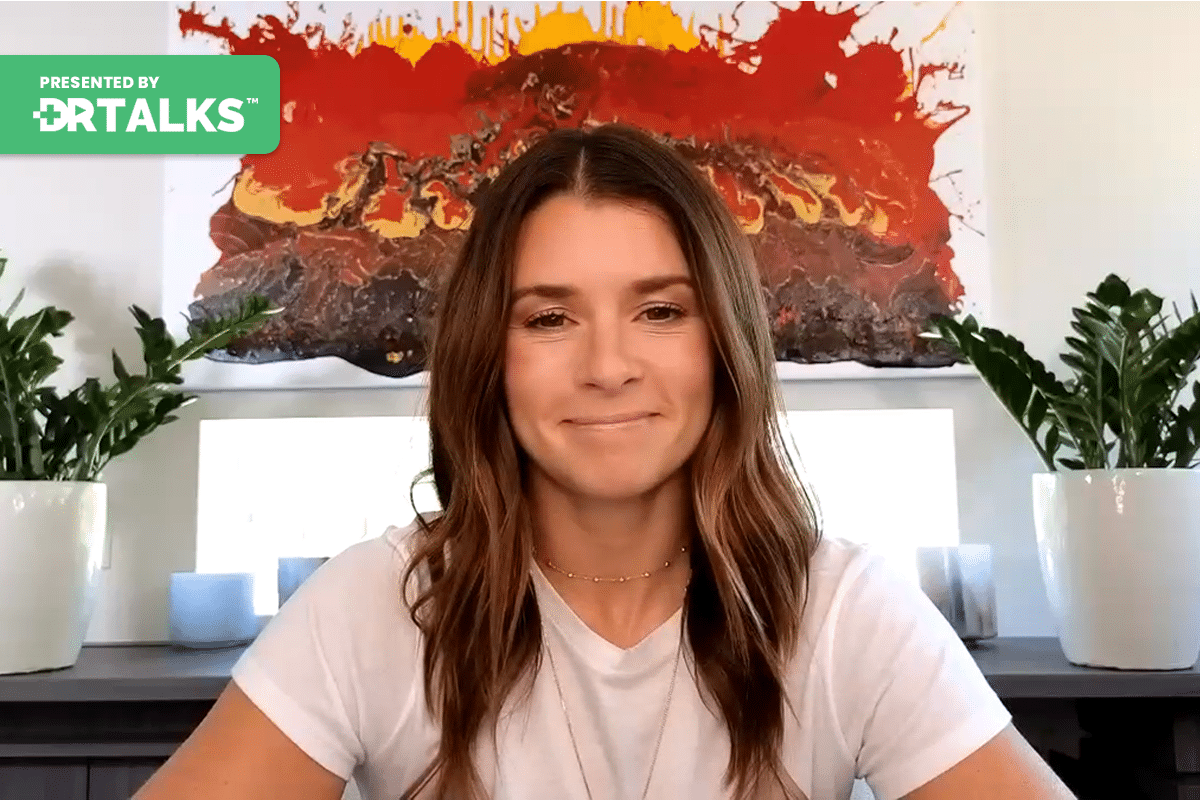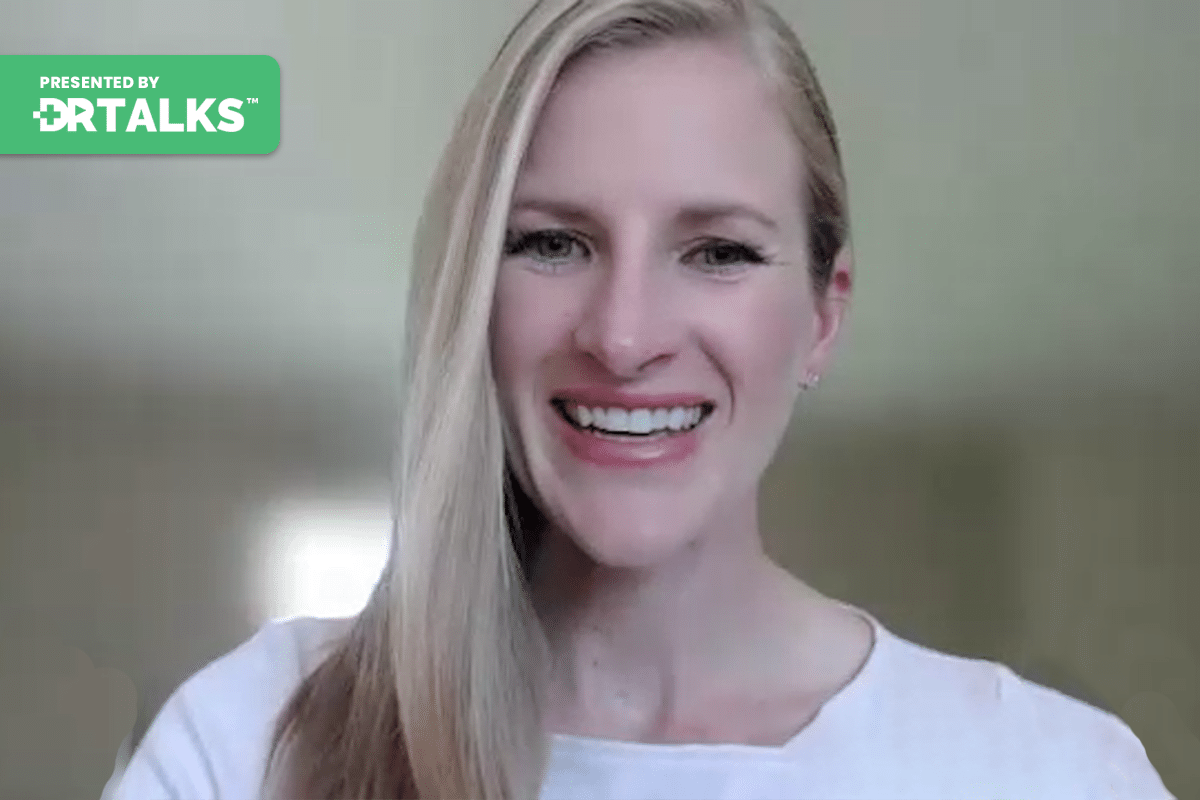Join the discussion below

Kashif Khan is the Chief Executive Officer and Founder of The DNA Company, where personalized medicine is being pioneered through unique insights into the human genome. With the largest study of its kind globally, The DNA Company has developed a functional approach to genomic interpretation overlaying environment, nutrition, and lifestyle... Read More
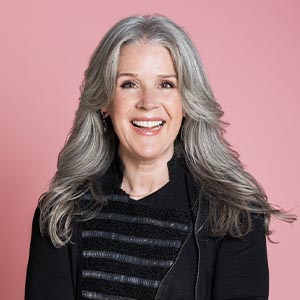
For health coach, Laurie Lewis, menopause dealt a crushing blow -- including brain fog, pain, memory loss, and the sudden weight gain of 50 pounds. She tried everything she knew to feel better, and the methods that worked in the past made no difference. After years of struggle, she suddenly... Read More
- Reclaim control over your daily struggles by implementing simple yet transformative changes that not only alleviate immediate challenges but also lay the foundation for a lifetime of wellness and longevity
- Gain an understanding that fasting is a versatile tool with various approaches and that it’s not about dieting but about strategic nourishment for your body
- Learn how to adopt tailored fasting practices that align with your unique needs, goals, and lifestyle, elevating your physical and mental health
Kashif Khan
All right, everyone, welcome back. We are joined today by Laurie Lewis. Thank you for coming here.
Laurie Lewis
What a joy. Thank you.
Kashif Khan
It’s going to be a joy because we’re going to talk about, well, a few things. First of all, you’re kind enough to open up, and you’re going to be telling us your story and how you got to where you are, which is awesome. But also a unique perspective on fasting and how to implement it, how it affects menopause, etc. Just a little bit about what you told me before we started going. I think it’s something that people need to hear because not everyone’s journey is the same, and yours got you to where you are. You look incredible. You look like your health is not something you have to worry about. Well, it took work to get you there, right? So we’re going to dive in and discover all this stuff, starting with your own challenges and how you used fasting during menopause to sort of turn that around. Maybe dive into us and tell us about that.
Laurie Lewis
I love this conversation with you. Thank you, Kashif. I imagine being a grown woman, 54 years old, in your mother’s kitchen, throwing a complete temper tantrum like you were five years old, losing your mind. That was me. What caused this meltdown at the age of 54 was that I had been really struggling with perimenopause, and menopause pushed me down a dark hole for about ten years. But they don’t send us to biology class for older women, so we don’t know what’s happening. Don’t put the dots together, right? And so there I was, after ten years of struggle. I went home to Colorado, where I grew up. I was at my mom’s house. I had suddenly gained 50 pounds during menopause. Like, boom. I didn’t change anything about my food. I have been a healthy eater since I was in my late twenties, studying nutrition. That’s my personal passion. I changed nothing, and I gained 50 pounds because of the hormonal chaos of perimenopause and menopause. And my mom said, Let’s use this time when you’re home to turn the weight around. And I lost it. My daughter’s ears did not hear that as helpful. I had my wailing and boot-stomping. She was such a loving mom. She’s passed. But since then, that was six years ago. And she listened, and she said, Let’s pray for an answer. Because I was telling her I had tried everything. Not only to lose 50 pounds but to feel better. I had brain fog and memory loss. I was aching; just like every joint, every muscle was hurting from the top of my head to the bottom of my feet. And that night, I tucked myself into bed. We all know we shouldn’t get on our phones, computers, or batteries and turn the lights off. But I googled the same thing I always had, which was something like menopausal, hormonal, stubborn fat, and popped up, intermittent fasting.
I’ve been studying nutrition since my late twenties, and I knew about long-term therapeutic fasting, but I didn’t know that you could incorporate a daily pattern. A daily regimen of abstaining from nutrients, flavors, sweetness, and so forth, such as fasting hours, healing hours, and eating window hours. I didn’t know you could live like that, so I stayed up all night studying it, and it just made perfect sense to me. I went downstairs in the morning and said to my mom, Thank you. I think I found an answer. She inquired, and she said, That makes perfect sense. How may I support you? That was the first day, six years ago, when I had an eating window. I’ve never missed a day. I love that I’ve never missed a day because then people can see as an example that you can either in the evening, when you close your eating window, look ahead and decide when your eating window is going to be tomorrow, or when you wake up in the morning, you can see what the day holds. Some people love having the same thing every day. Some people love moving it around. It’s all customized. So every day for six years, and so quickly, there are two aspects that I think are really important. It took me 15 months to lose 51 pounds. I didn’t change anything about my food. I only incorporated intermittent fasting and 15 months of healing and repair, fat burning, being in ketosis, autophagy, and all the great healing that happens. But the most amazing thing was that I felt better in three days.
Kashif Khan
Yes, that’s incredible.
Laurie Lewis
I was standing in that same place in her kitchen, and all of a sudden I had the thought, There I am, there I am. It was suddenly clear again. I was grounded. I felt like myself. I was back in my body. I didn’t feel anymore, like I’d been abducted by some sort of alien. That the alien disappeared. I’ve never quite said it like that before, but I was myself, and that was very motivating.
Kashif Khan
It’s truly awesome, and it really paints a picture of how close we are to good health. You feel horrible. This thing that you think you have, whether it’s fibromyalgia, endometriosis, or a rocky menopause, if in three days you can start to feel amazing, that’s how close to good health we actually are. If we start to have the right habits and just need to lean in that direction a little bit, and you prove to yourself that you don’t hear that very often, But if you start doing things right, you can unwind it pretty quickly. So I guess that speaks to, like, what’s the driver, or is it a metabolic issue? Like, why? Why is it that all of a sudden this one thing—wow, everything was alleviated—comes crashing down and you feel amazing?
Laurie Lewis
Well, that is a big question. What’s the driver? We’re a very complex system. I also hear in your response to me and in your question the importance of mindset. Everything you just said was so hopeful. If a person holds, Oh, just feel emotion. If a person can hold that, it’s so close to their body. I have this dream that each person develops every human, that it becomes part of our way of being human, that we develop a reverence, a communion, a beautiful partnership with our body, and that human beings would never dream of saying, I hate my body or my body is my enemy. It’s like, No, we’re so close. What are the most important aspects of this complex system for balancing those hormones, getting the fat off our liver, healing the gut, and reducing inflammation? Like one of the wild things that happened to me, it was within 3 to 4 months. It was somewhere around September. I noticed that my debilitating plantar fasciitis had disappeared, which I’d had for ten years. I didn’t wake up in pain anymore. A book that helped me a lot was Dr. Ben Beckman’s Why We Get Sick. And the premise of his book is that the underlying cause of all metabolic diseases is high circulating insulin and high inflammation.
Strangely enough, those are tests that they do not include in our conventional lab work here in the U.S., like, you have to beg for fasting insulin and the inflammation test, CRP, ESR, and so forth. What’s amazing is that you see all sorts of articles about lowering inflammation with this food and that food. Step one: My people start fasting clean and have an eating window, and inflammation is going to come down. You’re going to lower your circulating insulin, which will then affect your blood sugar. And I think one of the things that people get concerned about is elevated cortisol because we live in very stressful, fast-paced times, and people are sleep deprived, so they’re worried about yet one more thing: raising cortisol. Well, if you’re discovering for yourself a fasting rhythm, a fasting sweet spot, and an eating window that works for your goals, your body, your life, your family, your work commute, your work, and your fitness, that feels delicious to the body. That is not a stressor at all. There is a moment where you’ll have a hunger wave, and you just ride it out. You’re burning fat, and suddenly you’re not hungry anymore, and you open your eating window later. With this idea that fasting is a stressor, I tend to disagree because I coach my people to have it be yummy for you and your life or something.
Kashif Khan
The way you approach it, it doesn’t have to be so rigid and regimented, like, Here’s what you have to do. But I don’t feel like that today. I have to work out today, or I didn’t sleep properly today, or whatever. To understand that, that window is the key, right? That time is right. It can be adjusted. I feel the same. There are days when I know I can fast longer. When I workout, I lose my hunger. I started training. So I’ll try and work out later in the day to be able to extend my fasts because it’s one tool that allows me to keep going. You would think that’s counterintuitive, like, Oh, you need food to work out. No, there are plenty. I still have a little bit of a timer here, so there’s plenty.
Laurie Lewis
None of us are zero-fat; we have plenty to burn. I suspect that maybe the next day you’re hungrier, and in your eating window, do you feel like you need more food?
Kashif Khan
For sure. If it’s a big workout. If it’s a big deal now, if I do this consistently, or if I do it for like 30 days straight, it becomes routine, and I don’t even have an appetite. It’s like that, but I’m also using minerals and other things. But that being said, for sure, in a regular week, Yes, I’ll get hungrier, like today, for example. Yesterday I did a bit of work out, so I’m hungry. You said something in there, a little nuanced thing. I don’t know if people caught it. But you said, fasting clean. That was a very purposeful word you used. What do you mean?
Laurie Lewis
It is a purposeful word and concept. Fast and clean. The idea was coined by Gin Stevens, whose first book was called Delay, Don’t Deny. It was a runaway hit because it felt like reading an informative book by a smart friend. Then her next book was called Fast Feast, Repeat. It was a New York Times bestseller, and Gin’s idea of fasting and cleaning is really a purist fast; that’s actually fasting. But we have to differentiate between fasting, cleaning, and fasting with eating or taking in nutrients or flavors. Because you can find anything on the Internet to give you approval to do whatever you want. So the clean fast requires a bit more, dare I say, rigidity during the fasting hours. But then this idea of her first book, which is Delay, Don’t Deny, that you’re eating the foods that you love later in your eating window, so save the nutrients, save the flavor party, people are like, Oh, but that lemon in the water is just going to get me through. I’m losing my mind.
Okay. That’s really just during the adjustment phase, when people are getting bored, antsy, or not used to having no flavors in their mouth. They want to be entertained by flavor. It’s like, Oh, well, that’s just interesting to notice, isn’t it? So savor the flavor party later. Now why would it be fast and clean? I’ll say what it is. Plain unflavored water, plain unflavored black coffee, plain unflavored bitter black or green tea, not with lemongrass and ginger, and all the other things. Plain unflavored minerals, so electrolytes: magnesium, sodium, and then your prescriptions, your medications as prescribed by your doctor. So again, plain, unflavored water is the theme here.
Now, why would we do that? It’s counterintuitive. It actually makes fasting easier when we take in food flavors, whether it’s lemon or cucumber, because then the body is anticipating the incoming food it is aligned to receive. It’s like a little taste of lemon. The body’s like, Well, who are you going to feed me? And it aligns to receive that food hormonally in the digestive tract. It’s ready to go, and you don’t feed it because you think you’re fasting. The body gets grumpy. That makes fasting harder, so make it easier on yourself. Plain, unflavored water. Plain, unflavored black coffee. Plain, unflavored, bitter black or green tea. Then the other thing is that we want all the healing benefits of the fasting hours. So we want to put our body into full digestive rest. We want to go through glucose and glycogen and shift into fat burning, be metabolically flexible, become fat-adapted, go into ketosis, and fuel our brain on ketones. And there’s nice, bright, clear, clean energy.
We want a deep cellular repair of autophagy. We want to boost human growth hormone. We want all the healing. We want our body to address cancer cells. We want our body to be reducing inflammation, boosting immunity, and healing our gut lining. Fast and clean are very simple. It allows for all that deep healing, and then we get to eat the yummy foods that make us feel really well that we’re anticipating, which is very exciting for the human chemical. Make it like, we human beings are happier who are, who can wait later for gratification, who are able to delay gratification. There have been enough studies, scientific studies, and research on human beings being happier when they know how to delay gratification. And that comes from, eating later, which ultimately makes for happy people there.
Kashif Khan
People don’t realize they’re the same thing. You’re giving up pleasure, but you’re getting a sense of reward for achieving it by giving it up. Both of those things are dopamine. They’re both satisfied, right?
Laurie Lewis
That’s right.
Kashif Khan
In the sense of satisfaction, a reward is much more satisfying than pleasure. You need more and more. There is no satisfaction in pleasure. Right? So you can replace the pleasure with a reward. And that’s what you’re describing.
Laurie Lewis
That’s right. And it’s really a win-win. It’s really a scenario where, like you said, you kind of get to have it all, but in very short order, usually within two weeks, my clients are saying, Wait a sec, I feel better when I’m fasting. Fasting isn’t the problem; it’s the eating window that becomes challenging for people. I’ve found, Kashif, that within the first few weeks of people taking on a clean fasting and eating window schedule, they say right away, really within the first two weeks, that the fasting hours are not a problem. They really like it. And then the eating window becomes their issue, where they’re trying to figure out what foods are satisfying. I’m eating too quickly; how do I get enough nutrients? Once the fasting becomes your daily practice, which is pretty quick, and people realize how well they feel, then we can focus on the food. I do it a little backward.
Then, many doctors and coaches say that you need to get the food sorted and then start the fasting. I could not disagree more with that. The easiest thing for people to do is to look at their lives and decide when they’re closing their eating window this evening. What time are you going to stop eating? Then you’ll drink plain water after that. Then you’ll go to sleep, wake up tomorrow, and drink plain water. If you like coffee, have a black coffee; you won’t die. And then later, open your eating window whenever it feels right for you. Then you’re gradually going to shrink those eating window hours and gradually extend the fasting hours, and people discover very quickly how well they feel. It’s just so motivating for people to be able to stop, especially women. Especially women over 44 is kind of the cutoff for me. As I said, I help women aged 44 to forever. We all want to stop this street brawl, but with those cravings and the hormones, the best way to do that is to start establishing a clean fasting regimen. And then we get to sort out the food together.
Kashif Khan
Yes, I agree with you there. I’ve seen that where habit formation, structure is important versus frantically thinking about the food and where I’m going to eat, and what I’m going to eat. When this structure is innate, it makes everything easier because you start thinking that way, and then you’re automatically thinking about your food cleaner. Because you’ve got this habit, you’ve changed the way you approach your food. You’re not going to shove a bunch of cookies down your throat because there’s limited time to get what you actually need, right? Once you get it in full quicker and the satiety is faster. You mentioned something earlier about, when it comes to eating clean, a kind of light bulb went off because I didn’t realize or think about it that all these people would be adding flavors and things that are not necessarily calories but just to feel good and to feel satisfied. And the body is very intelligent. So even just tasting something sweet will trigger an insulin response. You don’t actually have to have sugar in your book. You’re right, the genes start expressing, and insulin is triggered, which leads to Where’s the food? I’m hungry, and it screws up your fast. And I literally never even thought about that until you brought it up right now. But is it the same? Do you also say nothing salty? I know some people will literally take mineral salts and lick them to keep themselves going.
Laurie Lewis
No, salt is different if people are taking in very high-quality, natural, not over processed table salt in the blue container as if it’s real good salt. I don’t believe in taking in too much salt, but when insulin is low, especially for new fasts, the kidneys tend to dump magnesium and sodium. So the other piece of plain unflavored water is plain unflavored black coffee, if you like coffee, or tea, if you like tea, but real actual tea leaves, not mint or camomile. And then, as the fourth element, there are minerals. So magnesium and sodium. I find that a lot of people do become reliant on that sodium, just like it’s another trigger thing, like entertainment. In our society, we have been conditioned to use food to resolve all of our emotions. Anger, fear, and resentment hurt; boredom. The feeling that we need a break is something we deserve, and even then, it is shifting. Even if a person is keeping an eating window and delaying their eating until later, I encourage people, and this is part of my coaching, too, to start to notice what they’re using for comfort.
I also don’t believe in licking too much salt. The other thing that people talk about a lot is putting fat in their coffee, and that could possibly be part of fasting. It’s like, Come on, people. We’re all smart here. Just think of it this way. People are like, Oh, but the fat in my coffee gives me this nice, sustained energy all morning, and then I can eat later, and it’s no problem. Okay, but. But wouldn’t you rather burn the fat on your belly than the fat in your coffee cup? If you’re utilizing fat as an energy source to give you nice, beautiful, sustained energy until you eat later, wouldn’t you want that fat to be on your body? Yes. I do not want fat in my coffee cup. I want my body to burn its own fat. Now, for all these years I’ve been at my ideal weight, I’m fueling on most of my own body fat. Most of the time, I’m 60 years old, and I have had my biological age tested, and I have the biological age of a 40-year-old. I’m working to make that younger, which is not because I’m chasing youth but because I’m very interested in my deep cellular health, my mitochondria, and my telomeres.
I am very interested in this idea of longevity for people. It’s all the rage. But what I’ve discovered pretty quickly is that people, normal people like you and me, just want to actually feel better. At the top of our conversation, you were saying we’re so close to good health. We’re so close to feeling well. People want to wake up in the morning rested, look at the day ahead, have no aches and pains or fatigue in their body, be sharp and clear, get through that, be able to sit on the floor and stand back up again, and feel flexibility in their body, strength, and stamina. That’s what people want. That is the most important thing to me: that people keep an eating window open and look for ways throughout the day and throughout their lives to take really good care of themselves so that no matter what is happening in life, whether it’s good times or bad, you’re a person who naturally takes really good care of herself, no matter what’s happening in life. That is really important to me.
Kashif Khan
Yeah. And there’s from listening to you, I mean, there’s, there’s so many benefits to fasting and if you don’t understand all of them, then to me you may think it’s okay to adopt some habits that you shouldn’t. For example, if you don’t understand that it’s not only about autophagy and killing off cancer cells or whatever, but it’s also about burning your fat. If you knew that, then you wouldn’t eat fat, right? So if there’s the whole list of benefits, understand, those will help you understand the habits. Now there is a famous Lori Lewis quote.
Laurie Lewis
Yes, I have a few.
Kashif Khan
I’m going to read it word for word. And you’re going to explain why this is not a typo, but this is for real. You said intermittent fasting isn’t a diet. It’s a quiet.
Laurie Lewis
Yeah.
Kashif Khan
What does that mean?
Laurie Lewis
Well, let’s start with all of human history, evolution, and so forth. We have survived and thrived as a species. By having no food, human beings get stronger, brighter, and clearer in a fasted state. If we, in fact, got tired and lethargic and couldn’t move, we would not have had the strength to go out and find food. So the opposite is true. We get stronger and clearer. It has also been part of all spiritual and religious meditation traditions as far back as recorded history, that prayer and fasting. Why would those two things go together? Because fasting actually creates an emotional, cognitive, physical, and spiritual environment where we can connect more clearly, You can say what your body is telling you. You could say that the divine is communicating to you. People can interpret that however they please, but what is very real for people when they’re fasting is that it gets quiet. The noise gets quiet.
You can actually start communing with your body in a way that it is in the driver’s seat. With dieting and following a list of what you should and shouldn’t eat, eating little amounts of food all the time, and never feeling completely satisfied, and getting on the scale every day, and this frantic, What am I doing? Is that right? And I must be doing it wrong because it’s not working? All that noise gets really quiet when you’re fasting clean, and eating later, and tuning inward. All this noise of, How am I doing? How am I doing? Is it working? Is it working well? How do you feel? And people start feeling better and better, and the noise goes away. It’s amazing in my coaching calls because people will come to me with a new curiosity. It’s like, Oh, where’d that come from now? If it’s from their friend or the news, that’s interesting to note. That’s external. But when a new curiosity arises, like, I wonder if I should eat more, fill in the blanks. I wonder if now I should really start reducing alcohol and sugar, or I wonder if I should sign up for pilates? Oh, Where did that come from? That came from the quiet. To diminish the outside noise and increase that inner communion is part of what happens when a person fasts clean and keeps an eating window, and you learn to trust yourself and your own body. And it’s a beautiful thing.
Kashif Khan
It truly is a beautiful thing. You just put two and two together for me because I’ve always fasted, but not as consistently as I have been in the last year and a half. There was a definite spiritual change that didn’t put the two together. I think it’s pretty clear that when you make that shift from pleasure to reward, you make that shift from being reactive and calling it impulsive to being very purposeful and caring for yourself and saying no to something that you really could enjoy, right? And enjoying saying no more, which gives you more satisfaction, completely changes the way your brain is wired. And we go; our brains are always rewiring themselves. So neuroplasticity is a constant, and you’re developing new neural pathways and thinking differently to become a different version of yourself. But what you just said makes it so much clearer why I feel the way I do and why I don’t have a menopause problem. That’s not what we’re talking about.
But I definitely feel what you’re saying, which is, Get rid of all that noise. Imagine your cells, the mitochondria, and the DNA. These are communication tools. They’re not just what we think they are. These actually communicate internally and externally. If they’re constantly burdened with metabolic mess and you’re eating three or four times a day and not eating the right stuff, then it’s burdensome in that regard. How are you communicating not only externally but even internally? So clean that up and give you a chance to breathe, and the cells can start thriving and communicating. I feel it. I feel exactly what you just described. But you put it into words that make sense to me, which is awesome.
Laurie Lewis
I love that, and let’s call it a menopause awakening issue instead. It is an issue, and it really can be an awakening. It’s something new for a woman to experience. And every woman experiences it differently for different amounts of time and years and to certain degrees of how it affects them. But it really is a pleasure to be able to help people get this noise quiet, because what I’m listening for is, Where are people? Where is the struggle? Stressors strain mentally, emotionally, and physically, and wherever there’s a struggle, stress, or strain, we’re going to make it better. And then that allows, as I said, this quiet. There’s a Dr. Bert Herring who coined the phrase appetite correction, which is one of the aspects of when you’re fast and clean and have an eating window. It’s a different length of time for everybody. That appetite correction kicks in. But what appetite correction is again, this quiet discernment. The body is very smart. We’re like wild animals; a lion knows how much to eat and when to stop eating, even if the carcass of the animal they just killed isn’t finished. They don’t like the whole thing being clean because their bodies say, I’m done, and our bodies can do that too. It’s just that with the constant eating and the ultra-processed food, our body has lost that communication. With daily clean fasting, we can then start getting the message from our body that we can stop eating now. We’ve had enough now. People wonder, when they’re new intermittent fasters, How do I know how much to eat? It’s all right. Just eat normally in your eating window.
What is normal? Eat what you normally eat. Then over time, usually a few weeks, sometimes a few months for people, the body starts saying, Stop now. So appetite correction affects us in two basic ways. The first is the quantity of food. And so you want to slow down, eat mindfully, pay attention to when hunger is gone, and stop eating. When hunger is gone and your body feels satisfied, the second aspect is the quality of the food. Your body starts saying broccoli, Brussels sprouts, and salmon as opposed to chips and crackers, fruity, sweet yogurt, and so forth. The quality of food is so that quiet, you can actually hear your body say, Stop now, eat more, eat this. Not interested in that. The way it shows up, let’s say you’re going to a restaurant; you used to go there all the time. Wherever you go there, you order your favorite thing. You haven’t been in a while, and now you’re an intermittent faster, and you get there. You don’t even need to look at the menu, but all of a sudden you’re kind of like, I don’t think I want that thing that I always get when I come here, huh? And then you look at the menu, and your body is going, Not that, not that, not that, that is what it’s interested in. So it’s starting to tell you what it’s interested in and not interested in. And so then your friends might be like, Oh, you’re trying to be good. It’s like, No, I’m not trying to be good. This is on a diet. I’m tuning into my body. This is not about being good; it’s about feeling good. And my body just told me what it wanted me to eat. So that’s what I’m eating. It sounds delicious. So it’s a subtle shift. There could be an obvious shift between diet, culture, diet mindset, and diet brain, which are all about being good. And I’m trying to be good, and that food is bad. If I eat it, I’m bad and fall off the wagon. No, that’s more of the noise. There’s just this quiet.
Kashif Khan
Yes, that’s beautiful. I have to also experience that. I feel like this is a therapy session for me.
Laurie Lewis
Great.
Kashif Khan
Yes. I’m coming over.
Laurie Lewis
Tell me more.
Kashif Khan
I know you actually work with thousands of women now; is there a contact or a problem they’ve been trying to solve where this doesn’t work? Or is it like all the time, this has been the one thing that, like, wow, this changed my life?
Laurie Lewis
When I meet people new and they are like, Oh, they either know someone who’s intermittent fasted, and they’re like, Oh my, you know, so-and-so, they say, or they say, Oh, I tried that. I never felt better. I’m like, Oh, what happened? You’re not doing it anymore. And they took a trip, or they had a crisis in their family. They’re like, I never got back to it. Or they say, I tried that. It didn’t work for me. I want to talk to all those people, but I’m especially curious about the people who say it didn’t work for them. So I want to know where they eat and clean. I want to know how long they tried it for. Did they even get through the adjustment phase? I want to know what working means, or are you just looking at the scale? Like, how many hours a week? Sometimes people like fasting. They have a lot of weight to lose or health to turn around, and they’re having a ten-hour eating window. Okay, well, that’s a great place to start, but we’ve got to shrink that eating window. If you’ve got to turn around some health stuff, Or conversely, people will say, Yes, I did it for two and a half weeks. I had a one-hour eating window. I’m like, Lord, have mercy. It’s like, maybe you needed a longer eating window.
So I really want to dig in and figure out what you were doing. Were you fasting clean? What was your pattern? How long were you doing it? What medication are you on? What’s your fitness level? You know, the whole big picture. To answer your question, it’s most challenging for people to take very good care of themselves every day when they’re addicted to ultra-processed food and refined sugar. That becomes the biggest challenge because addiction is a really strong word. But when something’s got its claws in you and you have the thought that it would be a very sad or impossible life without that thing, that’s really something to take a look at. You’re fasting clean, and keeping an eating window helps a person with stability. Once we find that, clean fasting, curiosity, and customization, we’re in the continuing phase, and then we’ve got to look at all the other aspects of health, whether it’s sleep, hydration, movement, food quality, meditation, quiet time, time in nature, or reducing stress. The biggest issue seems to be shifting towards real, whole foods and away from refined sugars and ultra-processed foods. Because it’s pretending to be our friend. It’s pretending to make us feel better at the moment. It’s pretending to solve the problem that I’m so busy and rushed and I just have to eat something. It’s that, and I don’t demonize food. I just want people to start to consider that that isn’t food.
Kashif Khan
Yes. I demonize food. I do not mind.
Laurie Lewis
Well.
Kashif Khan
These are all the things that shouldn’t be called food. Let’s say that.
Laurie Lewis
It can make me mad, too. It’s the trickery involved in it, right? That’s the whole aisle of energy bars in the grocery store. It’s like, I don’t know if you ever noticed, but I have anecdotal evidence that when people eat energy bars, they are ravenously hungry an hour later for more ultra-processed food. Energy bars are highly processed foods. Their shake powders are ultra-processed foods. So we’ve got to be very discerning about the quality of those foods if we choose them, because they are not the same as an orange, an apple, a sweet potato, or a steak. I’m just really committed to people feeling better and feeling in control of their choices, and what gets in the way of people who come to intermittent fasting is usually first and foremost for weight loss. So you ask, Does this work for everyone? For sure, everyone will feel better. Your health markers, if people are testing for fasting, insulin, and inflammation, but then your ASTI and alt and a1c and fasting blood glucose and your HDL go up and your triglycerides come down, like those numbers for sure will be affected, and still some people, especially women in menopause, experience weight loss resistance. We absolutely, in a gentle way, need to have a daily investigation of what’s happening in your body that is not feeling 100% comfortable yet releasing this excess fat. There’s nothing wrong with people being whatever size they are. What’s not awesome is feeling like a person is struggling to move and feels weighed down and lethargic. We want people to feel really good about their bodies. So sometimes that takes a lot of time.
Kashif Khan
The work you do, somebody that’s listening that wants to work with you, is it strictly around women that are in menopause, or is it anybody that wants to sort of help with fasting?
Laurie Lewis
It’s interesting. I would say 5% of my clients are men. Most of them are dealing with a serious health concern, like, dealing with cancer or turning around type 2 diabetes, or hypertension. And most of my women clients are over 50, and I’m realizing more and more that more younger women, 39 to 50, are finding me because of the confusion and, for many women, how upsetting it is that their bodies are out of control. The checklist of issues that a woman can face in perimenopause is long. And we don’t necessarily connect the dots. We just know we don’t feel like ourselves and wonder what the heck is happening. I don’t know any doctors who are trained in menopause in medical school. Our OB-GYNs are mostly trained in fertility, and menopause is just treated as a condition you have to get through. I always joke with people; I’m like, yeah, erectile dysfunction is also a condition that people throw a lot of money and energy towards. Let’s pay more attention to what women are going through as they are shifting through these transition years, and what Dr. Lewin is presenting is called the upgrade.
Kashif Khan
It is just another phase, and it was taken for granted that it was supposed to be problematic when it doesn’t have to be. There are times when this shift is happening in an environment, food context, or stress context that isn’t what we are wired for. It becomes a roller coaster. So you have to understand what those habits are supposed to look like: what you’re supposed to eat, how you’re supposed to sleep, and what chemicals you’re not supposed to breathe in. What pills are you not supposed to take? Then, all of a sudden, you can feel good, and that’s amazing. The work that you’re doing helps people with that. So how do people find you if they want to know if you are working with any new people or not?
Laurie Lewis
Oh, my goodness. Yes. Oh, I just have amazing clients around the world in Kuwait, New Zealand, and Japan, and amazing clients in the U.S. and Canada. My business is called Fast Forward, and my website is FastForwardWellness.com. People can go there and poke around, and you can sign up for a checklist if you’re like, Wait, how do I start again? So it’s check, check, check, check, check. Step one is to decide today at what time you’re closing your eating window. What time is the best time? No, whenever you want. It’s like you get to say it, and so you can download that checklist. It’s fastforwardwellness.com, and I love it when people write to me there. If you have a question or if you want to set up a free little consultation, if you’re like, Oh, I like your style, I think you could help me. I would be glad to talk to you, and I would be glad to help people. Then I really worked with people for a year. We can establish a foundation within 6 to 8 weeks. But then it’s the fourth pillar of my coaching, which is the clean fast, curiosity, customization, and then continuing. And it’s all done in a spirit of celebration and care.
Kashif Khan
Important because that’s where people fall off. It’s like, Okay, here’s some information; here’s what to do, but are you actually going to do it? Unlikely. This is what health care should be. It’s not so much. Okay, I met you, and I told you some stuff. Now I’ll see you in six months. It’s. No, we need to work together for six months at a minimum. Because how do you unwind 45 or 50 years of habits in a phone call?
Laurie Lewis
It’s impossible. We are an animal, if you will, that’s designed for our community. We do better together. We really are better when we’re sharing and uplifting. One of the downsides of being together is comparison. It’s just that it makes us feel awful about ourselves. But when we’re in an uplifting community, if I had a dollar for every time I heard someone say, I know exactly what to do; I just have to do it alone, right? I’ve just got to get it together alone. And then I can. I just have to get it. I know exactly what to do. I just have to do it. No, no, no. Well, that’s what I’m here for, and so one of the great things is that I’m going to be leading my holiday program. I started my business five years ago, and this will be my sixth holiday program, coaching a group of people through Halloween candy to New Year’s, bubbly, really enjoying the holidays, not beating yourself up, fasting clean, having an eating window, eating and drinking the yummy things that feel festive to you, and never dieting again in January. So I always start planning my holiday program months and months in advance because I really look forward to supporting people through that time.
Kashif Khan
Very cool. Well, this is awesome. Great conversation. You opened my eyes to a couple things. I’m sure people are going to value this because we talked a lot about menopause and fasting. We didn’t put into context what you did for us today, which is amazing. I want to thank you, and I think everyone should check out the website, see what we’re up to, and use our checklist. Thank you for providing that. So it’s a pleasure. Thanks for joining us..
Laurie Lewis
Thank you. Such a joy.
Downloads

